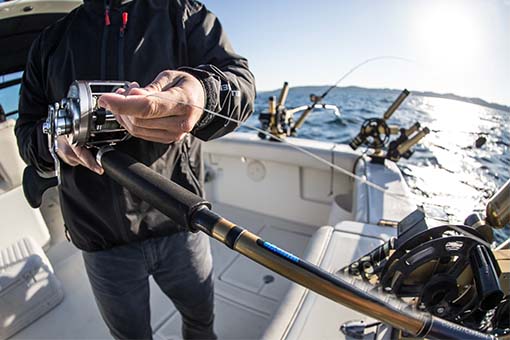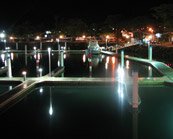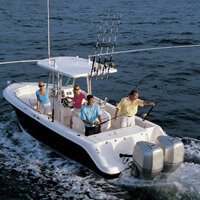If you enjoy saltwater fishing you probably consider deep sea fishing the ultimate challenge. But it’s important to make up a deep sea fishing gear list before each and every trip offshore, including what to wear. Having the right gear and clothing will help ensure success, and just as important, will keep you comfortable and happy during the trip.
Deep Sea Fishing Gear
We’ll address what to wear in specific in just a moment, but along with being properly clothed for the offshore environment you’ll want to make sure you have all the following gear.
• Fishing tackle (of course!)
• Loads of food and drink
• Sun protection including suntan lotion and sunglasses
• Full safety gear and a means of communication
• Binoculars
• Sea sickness medication (if necessary)
When it comes to fishing gear, your exact needs will depend on the species you’re targeting and the tactics you employ. Beyond that, you’ll also want to have a way to land the fish (nets and/or gaffs), pliers with snippers and/or a de-hooker, and a cooler for icing down the catch if your boat doesn’t have integrated fishboxes. Having plenty of food and drink takes on a new importance when you’re heading out to the deep sea fishing grounds, because you can’t simply pull over for more provisions. Topping the list is plenty of water, since dehydration is always a danger when you’re spending all day out in the hot sun. Also pack plenty of high-energy snacks like protein bars and fresh fruit, which you can chow down in a hurry if the bite is hot and you need a quick charge.
Whether you’re on an open center console boat or a large sportfishing yacht which has a cabin, you’re sure to be exposed to the sun for long periods of time so slathering up with suntan lotion is a must. Sunglasses should be considered critical gear, too, because the ocean’s surface reflects the UV rays and light levels can be practically blinding if you don’t have protection for your eyes.
Whether you’re heading offshore or just meandering around a lake, boating safety is always a priority. But when you cruise for miles out into the ocean it’s more important than ever to be 100-percent sure you have all your safety gear aboard and in good shape. Before deep sea fishing, you should always perform a full check of all your boats’ safety gear. You should also make sure you’re equipped beyond the minimum precautions and in addition to legally required safety gear, add things like a first aid kit, a snorkel and mask (in case the propeller becomes fouled), and additional communications gear. Speaking of which… When you’re out in deep sea fishing territory, you can’t depend on your cell phone to get a signal and in many areas of the nation once you’re more than a few miles from shore that phone becomes useless. You should always have a way to communicate with the authorities if need be, and the best device for that purpose is usually a VHF radio.
There are also a number of satellite communicators on the market, which allow you to send and receive text messages and/or hit a panic button to call for help if you need it. Binoculars belong on your deep sea fishing gear list, too. They can come in handy from a fishing perspective by enabling you to spot flocks of birds or flotsam, which can divulge the location of feeding fish. But just as important, binoculars can come in handy for identifying far-off navigational aids, landmarks, and other boats. Finally, if you or anyone in your crew gets seasick, having seasickness medication can save the day. Remember that most need to be taken ahead of time before you leave the dock, and in this case, an ounce of prevention is truly worth a pound of cure.
What to Wear Deep Sea Fishing
Whether you consider clothing “gear” or not, it’s certainly important to be properly dressed for deep sea fishing. You don’t want to be underdressed or you might have a miserable time, but the same is also true if you’re overdressed for the conditions. There are no hard and fast rules here, because just what clothing is proper depends on factors like where you’ll be and what time of year it is. What really counts is that you check the weather report the day before going, and come prepared for a wide variation of temperatures and conditions.
As you choose how to dress for the day, remember that the offshore environment is different than being on shore. You’re likely to be subject to more breeze and temperatures may be significantly cooler than they are on dry land since that breeze can be chilled by the water. Also bear in mind that you’re likely to get wet at some point, be it from the boat throwing spray of a big fish kicking its tail next to the boat, so you should choose clothing made of fabrics that dry quickly.
Also give some special attention to footwear. On large boats it may not be much of an issue, but often in the offshore environment the deck will get wet and wearing boots or at least choosing shoes that can drain if they get wet is a good move. But stay away from open-toe shoes and flip-flops or sandals, because these won’t protect your feet from a fish’s snapping teeth or a loose hook that fell on the deck.
If you’ll be on an open boat or when the weather is iffy, foul weather gear is another must-have. In fact, on many center consoles where the crew may be exposed to spray it’s not unusual for everyone aboard to suit up in protective bibs and a watertight jacket for the cruise out to the fishing grounds and also the cruise back home. There are countless choices on the market, but when you choose foul weather gear be sure to pick summer gear or cold weather gear as appropriate because while keeping you dry may be job number-one, the material, breathability, and thickness of foul weather gear goes a long way in providing warmth — or conversely, in keeping you cool.
Deep sea fishing can be an adventure of your lifetime, but if you go improperly equipped, it could turn into an unpleasant experience. So assemble your deep sea fishing gear ahead of time, and make sure you think carefully when considering what to wear deep sea fishing. Prepare properly, and soon you’ll be enjoying the ultimate in saltwater fishing adventures.


